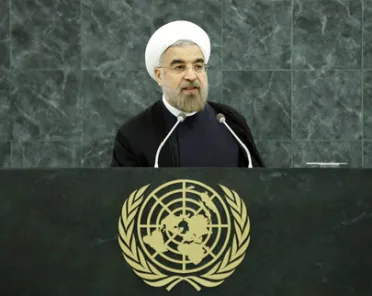Statement
Statement summary
HASSAN ROUHANI, President of Iran, declared that the age of “zero-sum games” in international relations was over. Coercive economic and military policies, practices used to maintain old forms of domination, and the practice of globalizing Western values negated peace, security and human dignity, as did the persistent “cold war mentality”. There was no guarantee that the era of quiet among big Powers would remain immune from violent discourse, practices and action, he said, warning that the impact of violent and extremist narratives must not be underestimated. He went on to emphasize that “strategic violence” manifested in efforts to deprive regional players of their natural domain of action, describing containment policies, regime change from outside and efforts to redraw political borders as “extremely dangerous and provocative”. Propagandist and unfounded faith-based phobia, including Islamophobia, “Shia-phobia and Iran-phobic discourse”, seriously threatened world peace and security. The so-called Iranian threat, used to justify a long catalogue of crimes in the past three decades, had assumed dangerous proportions, he warned, emphasizing that those who harped on it were themselves a threat to international peace and security. “ Iran poses absolutely no threat to the world or the region.” Describing the continuing practices imposed on the innocent people of Palestine as nothing less than structural violence, he said there was also no military solution to the crisis in Syria. Expansionist strategies and attempts to change the regional balance through proxies could not hide behind humanitarian rhetoric, he said, adding that the global community must work quickly to end the killing of innocent people. Welcoming Syria’s acceptance of the Chemical Weapons Convention, he said that extremist groups’ access to such weapons, which was the greatest danger to the region, must be considered in any disarmament plan. The illegitimate, ineffective threat, or actual use, of force would only exacerbate violence and crisis in the region. Violence and the use of drones against innocent people in the name of combating terrorism should be condemned, he said, adding that unjust sanctions were inhumane and contrary to peace. It was vital to promote tolerance and joint action in human society, he said. All challenges could be managed successfully through a smart, judicious blend of hope and moderation. As a regional Power, Iran would act responsibly in regional and global security affairs, and cooperate with other responsible actors. It defended peace based on democracy and the ballot box everywhere, including Syria and Bahrain. Iran sought to resolve problems, not create them, he said, stressing that acceptance of his country’s inalienable right was the best solution to the issue of its nuclear dossier. Underlining the exclusively peaceful nature of his country’s nuclear programme, he said nuclear weapons and other weapons of mass destruction had no place in Iran’s security and defence doctrine. National interests necessitated the removal of all reasonable concerns about its peaceful nuclear programme. To fulfil that objective, there must be acceptance and respect for Iran’s right to enrichment and other nuclear rights. Nuclear knowledge had been domesticated and Iran’s nuclear technology had reached industrial scale. It was an illusion, and extremely unrealistic, to presume that peaceful use of the nuclear programme could be ensured by impeding it through illegitimate pressures. The country was “prepared to engage in time-bound and results-oriented talks” to build mutual confidence and remove mutual uncertainties with full transparency, he stressed, adding that it sought constructive engagement with other countries, not to increase tensions with the United States. “Commensurate with the political will of the leadership in the United States,” he continued, “and hoping they will refrain from following the short-sighted interest of warmongering pressure groups, we can arrive at a framework to manage our differences.” Iran expected to hear a consistent voice from Washington. Noting that “peace is within reach”, he proposed, as an initial step, that the United Nations consider creating a World Against Violence and Extremism, or WAVE, and invited all States, global organizations and civil institutions to participate. He also proposed the formation of a “Coalition for Enduring Peace” to replace the ineffective “coalitions for war” spanning the globe.
Full statement
Read the full statement, in PDF format.
Photo

Previous sessions
Access the statements from previous sessions.
